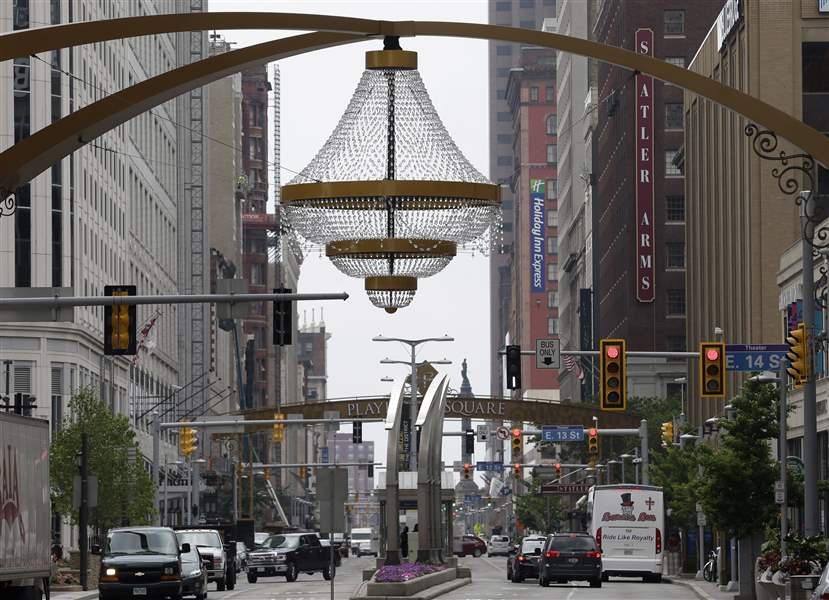
Cleveland, the 'Mistake by the Lake,' shows new face as it competes for political conventions
6/29/2014
Cleveland is one of two finalists for the Republican national convention in 2016 and a longshot candidate to host the Democratic convention as well.
ASSOCIATED PRESS

Cleveland is one of two finalists for the Republican national convention in 2016 and a longshot candidate to host the Democratic convention as well.
CLEVELAND — This Lake Erie city has suffered some bad public relations over the years and has made headlines for all the wrong reasons: poverty, pollution, foreclosure, bizarre crimes and a fleeing population. Yet, thanks to billions of dollars spent burnishing the city’s image and its physical face, Cleveland is one of two finalists for the Republican national convention in 2016 and a longshot candidate to host the Democrats, as well.
The city once dubbed “The Mistake by the Lake” will get a chance in August to show how well it can handle big events when the international Gay Games come to town. The Gay Games have drawn more athletes than the Summer Olympics and have been hosted by the likes of Amsterdam and Sydney and, four years ago, Cologne, Germany.
A point-by-point look at humble Cleveland’s pros and cons:
A CITY ON THE RISE
Cleveland is indeed sparkling — literally.
The world’s largest chandelier was hung recently over the city’s main drag, Euclid Avenue, in the Playhouse Square theater district. Estimates are that $4.5 billion in projects have been completed in the past decade or are about to begin construction. The Flats East Bank project on the Cuyahoga River, once so polluted that it caught fire in 1969, features an office tower, a boutique hotel and entertainment venues, and a commitment for additional development. There’s also a new casino at Public Square.
Downtown streets that once emptied when the working crowd left for the suburbs now come alive with visitors and residents. Still to come are plans for a lakeside retail and housing development behind the Rock and Roll Hall of Fame and Museum, an international tourist attraction.
On Euclid, popular nightspots have replaced boarded-up storefronts. There’s the Euro flavor of East 4th Street and its high-end dining. The Warehouse District, a collection of clubs and restaurants, is dense with revelers most nights and has become a popular choice for millennials willing to pay big bucks to live downtown. University Circle, easily reached from downtown by the Regional Transit Authority’s Healthline bus system, is undergoing its own renaissance, with extensive construction of post-modern buildings and a $350 million renovation and expansion of the Cleveland Museum of Art.
BUT NOT ALL IS WELL
In a country where the gap between the rich and everyone else is growing, the other side of Cleveland’s urban ledger cannot be ignored.
Cleveland is second only to its neighbor to the northwest, Detroit, as the nation’s poorest big city. Just 59 percent of children who attend Cleveland’s city high schools graduate after four years.
Housing prices have plummeted in many neighborhoods, especially those ravaged by the foreclosure crisis. Boarded-up and abandoned homes abound, leading to “blight flight.” Cleveland’s population has plummeted from 478,000 in 2000 to an estimated 390,000 in 2014.
While it’s not likely those neighborhoods would get many visits from convention delegates, the morbidly curious should not waste their time traveling to Imperial Avenue, where serial killer Anthony Sowell once lived, or to Seymour Avenue, where Ariel Castro held three young women captive for a decade. Both of the men’s homes and their grisly crime scenes have been demolished.
POLITICAL INTENTIONS
Ohio is a bellwether state for presidential politics, and the Cleveland area is a key battleground.
No presidential candidate has won without Ohio’s bounty of electoral votes since John F. Kennedy in 1960. George W. Bush clinched his re-election bid in Ohio. President Barack Obama carried the state twice, thanks in no small part to ardent support from Cleveland and its black community.
While Cleveland is known as a bastion of Democratic politics, there are plenty of votes available for the GOP in its county, Cuyahoga, which has the second-largest number of registered Republicans in the state after Franklin County, home of Columbus, the capital. Columbus also is in the running for the Democratic convention.
The only two conventions Cleveland has hosted were for Republicans. Incumbent Calvin Coolidge was nominated there in 1924. Things didn’t work out so well for Alf Landon, who was trying to unseat President Franklin D. Roosevelt in 1936.
MORE THAN POLITICS
Party officials say politics has less to do with Cleveland making the Republican convention short list than its technical capabilities to host the convention.
Republicans are expected to choose between Cleveland and Dallas in mid-August, around or after when the Gay Games are held in Cleveland.
The games, like a national convention, will shine a spotlight that civic and political leaders hope will leave visitors with a positive impression and a desire to return.
As with the political conventions, the city lobbied hard to land the Gay Games, knowing that tens of millions of dollars will flow into the local economy. Cleveland even had a dress rehearsal for the Gay Games last year when it hosted the U.S. Senior Games, an Olympic-like event that helped christen the city’s new taxpayer-funded convention center.
Cleveland became a finalist for the GOP after its experts determined that Quicken Loans Arena, the city’s hotel capacity and transportation plan, and the availability of alternative meeting sites fit the party’s needs.
Democrats are expected to decide at the end of this year or early next year. In addition to Columbus, Cleveland’s competition for the Democratic convention includes Philadelphia and Phoenix.